Lesley-Anne's arch nemesis is maths. It's always been the subject that gives her the most grief. Despite this, she has managed to do reasonably well in maths thus far through sheer hard work.
When she hit sec 3 this year however, the struggle really got to her, particularly in A Maths. So much so that she asked for maths tuition as she was unable to follow the lessons in school. Despite this, she still flunked her mid-year A Math exam dismally. She was terribly upset because she had spent a lot of time working on it, at the expense of some other subjects. Yet when she told me the news, I said, "good!"
Before you gasp and call me a sadist, I want to clarify that I do appreciate the work she has put in and I do empathise with her disappointment. However, I find that for high achieving kids like Lesley-Anne, failure can be such a foreign concept. While she's not one of the truly top scorers, she generally does well academically even in a competitive school and is able to juggle lots of other activities like piano, ballet and a heavy CCA.
I understand how some parents might think this is a dream scenario but in this respect, I actually worry more for her than for Andre. For kids like Andre, failure is part and parcel of their everyday life. He has to put in twice the effort as Lesley-Anne to achieve half the results. And even then, he often doesn't get the results he desires, both academically and in sports. Ironically then, his successes are celebrated more because they're not expected, they're a bonus.
To me, kids who have not tasted failure are in a much more vulnerable position. In an achievement-centric system like Singapore's, kids like Lesley-Anne tend to link their self-esteem with their accomplishments. This comes about because they are constantly praised by teachers and parents for their academic and other achievements, so that they internalise the message as, "I'm valued because of what I've achieved, not who I am."
I've definitely been guilty of reinforcing this.
When my kids were much younger, I used to wonder why it was that my very accomplished daughter seemed to have a shakier self-esteem than her much less academic brother. Lesley-Anne was the typical high achieving student in lower primary, always aiming for high marks and striving to please us. But she was also inward-looking and shied away from trying new things.
Contrast this with Andre, whose self-esteem is not linked to his academic achievement (thank God for that!) He may be disappointed with bad marks but they don't cause him to think less of himself, at least not for long. He's also less worried about the unknown and more ready to laugh at his own mistakes.
It was only later, I think when Lesley-Anne was in p4, that the reality dawned on me. Her teacher asked each student to stand up and tell the class what he or she is most afraid of. She stood up and declared, "I'm afraid of failure." That's when I realised that all those times of praising her for her achievements and scolding her when her results didn't meet expectations (like 99% of other parents), were actually having a damaging effect on her character.
Time for damage control then. From then, I tried to de-link achievement and value. I consciously encouraged and praised her for trying new things out of her comfort zone (even if it's something as trivial as going on a roller coaster). I told her it's the effort that counts and I tried to mean what I said, so if she came home with an unsatisfactory score, I wouldn't berate her for it because I know she had worked hard for it. The score was inconsequential.
I do feel that these measures have made a difference and even though she still strives to score well (nothing wrong with that, by the way), I'd like to believe that her scores no longer affect her self-esteem.
I strongly believe that this lesson is an important one. For kids who have always succeeded, the fear of failing can become crippling. Afterall, the higher you go, the further you have to fall. Inadvertently, they start fashioning their lives around not falling, by doing only things they think they will succeed in. It prevents them from trying new stuff, from enjoying their lives. It imprisons them.
This brings me to this book,
"The Happy Student" by Daniel Wong. Daniel is a product of the Singapore education system and offered to send me a copy of his book. I'll admit when he first contacted me, I was skeptical. I told him I wasn't going to use my blog as an advertising platform and I'd write about it only if I felt it had value.
After reading parts of it, I thought I'd mention it here. I like that Daniel was a local student (he attended Tao Nan, Raffles Institution and Victoria JC) because that's definitely something other students can connect with. Essentially, he recounts all the anxiety and disatisfaction he felt with chasing grades and tries to bring about awareness that academic achievement does not equate fulfillment, based on his own experience. I also like his casual writing style - it's friendly and easy to read.
However, don't expect any earth-shattering revelations. Most of what he says is common sense, nothing new. Basically he says what I've been saying all along, it's the journey, not the destination that counts. I think the book might be useful for high flying students who face the same dilemma of grade-chasing for its own sake, to give them some perspective from someone who's been there, done that. If I have one criticism of the book, it's that Daniel seems too much like the perfect student to be true, that he risks alienating some readers. I think he would have come across more real if he had included some instances where he'd failed and how he got back on his feet, but that's just my opinion.
As I was flipping through the book, I came across this page, which confirms what I've been saying earlier - that focusing on academic success is actually detrimental to character building and learning:
"When you've attained superficial success, there's a lot of pressure on you to continue succeeding... I performed well academically throughout my schooling years. Consequently, I felt the need to keep up my grades. I began to fear the possibility of not getting an A for a class. In order to ensure that I kept getting A's, I only took classes that I'd already demonstrated an aptitude for. I shied away from classes or activities where my aptitude hadn't yet been tested. This meant that I never tried my hand at things like dance, theater or literature.
This resulted in more A's but less education, more awards but less fulfillment, more accomplishments but less growth - and this was driven entirely by fear."
- The Happy Student, Daniel Wong, p132
I therefore truly believe that the occasional dose of failure is healthy, especially when you're young. It will help you recognise that failure is an essential part of life's journey, and that picking yourself up and trying again is nothing to be ashamed of, in fact, is part of the process of growing as an individual. A caveat though, I'm not talking about failing something that you didn't have time to work on or didn't bother to put in the effort. I'm talking about failing despite the effort and long hours.
As part of my work, I interview many doctors and healthcare professionals. A senior doctor in charge of education at SingHealth once told me about a very tough medical exam which has a high failure rate of 75%. The medical students who sit for the exam know that passing would be a challenge. Yet when they fail, some of them behave like it's the end of the world and start questioning their own abilities. That's because they have become so accustomed to success that they are completely unequipped to deal with failure. The senior doctor looked amused, "It's just an exam! Pick yourself up and try again."
That's what we need to teach our kids, folks.
And so to Lesley-Anne, I say, "you failed your math exam? Good! It's ok. Try again next time."
"Succeed by failing." - Gretchen Rubin
 Why hate? Well, they've begun to sag. Actually, I think the sagging process started the minute I put my books on them. Ikea reduces the price every year but what they don't tell you is they also reduce the quality until it's virtually just a couple of cardboard sheets acting as shelves. Is it only me who thinks it's ridiculous to sell a bookshelf that's not designed to hold the weight of books? Damn you, Billy Bookcase. If only you didn't look so good.
Why hate? Well, they've begun to sag. Actually, I think the sagging process started the minute I put my books on them. Ikea reduces the price every year but what they don't tell you is they also reduce the quality until it's virtually just a couple of cardboard sheets acting as shelves. Is it only me who thinks it's ridiculous to sell a bookshelf that's not designed to hold the weight of books? Damn you, Billy Bookcase. If only you didn't look so good. I don't just buy books, I buy book sets. I have a compulsive urge to collect entire book series, preferably in the same edition, thank you very much. My kids are beneficiaries of this obsession - I rarely turn down book requests (unless it's Twilight or Archie comics).
I don't just buy books, I buy book sets. I have a compulsive urge to collect entire book series, preferably in the same edition, thank you very much. My kids are beneficiaries of this obsession - I rarely turn down book requests (unless it's Twilight or Archie comics).








































